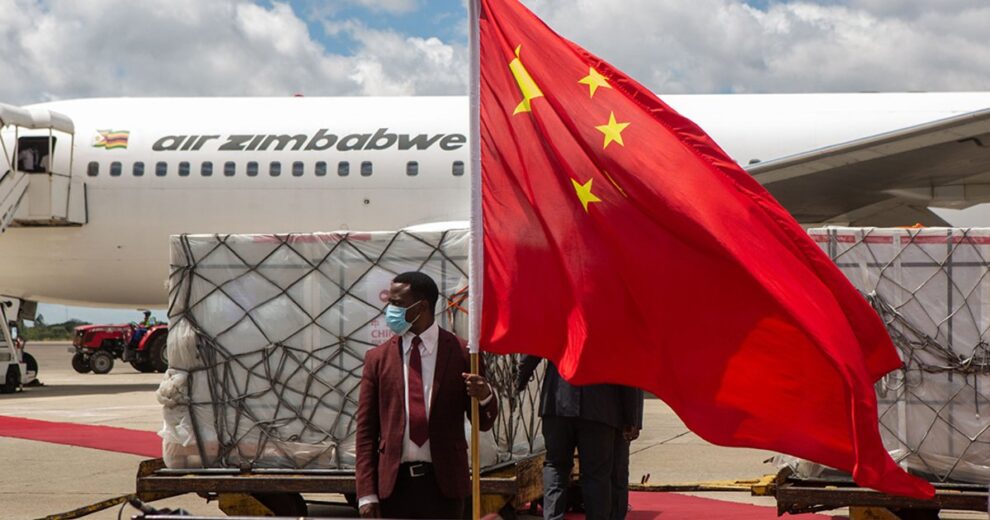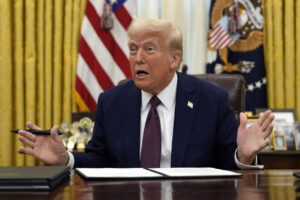According to a new book by Axios reporter Bethany Allen, China has developed an authoritarian economic statecraft to reshape the global order.
Bethany Allen’s Beijing Rules: How China Weaponized Its Economy to Confront the World, provides an expert overview of China’s behavior on the international stage. As an award-winning China reporter for Axios based in Taipei, Allen has had a front-row seat to China’s shifting global role and often provided breaking coverage of these developments. Chapters on the race to secure medical masks, China’s pressure on the World Health Organization and its president, Tedros Adhanom Ghebreyesus, and the global export of China’s Sinovac vaccine reflect the Chinese government’s growing confidence in its authoritarian system during the Covid-19 global pandemic. Beijing Rules compiles this reporting to offer a comprehensive narrative of China’s quest for global influence while also advising liberal democracies on how to strengthen their own systems in response.
Allen introduces the idea of authoritarian economic statecraft, as opposed to more frequently used terms such as sharp power, to conceptualize how China has employed its power and influence to achieve its geopolitical aims, drawing contrasts with more traditional uses of economic statecraft by the United States and other countries, such as sanctions.
The author’s exploration of the Zoom video conferencing platform is one of the most striking examples of Beijing’s new economic statecraft, demonstrating the Chinese state’s extraterritorial coercive reach. Although headquartered in San Jose, California, Zoom’s presence in China exposes it to a domestic law requiring companies to share the personal data of China-based users with the country’s primary civilian spy agency, the Ministry of State Security (MSS). However, an indictment by the U.S. Department of Justice showed that one of Zoom’s China-based executives went beyond Zoom’s authorizations to temporarily suspend the accounts of some U.S.-based users, violating the company’s terms of service. The executive shared the private data of U.S.-based users with the MSS and disrupted virtual commemorations of the 1989 Tiananmen Square massacre. The story of Zoom illustrates that U.S. officials’ concerns over data privacy could affect any U.S. company with operations in China and potentially silence activists beyond China’s borders.
The case of Australia, which Allen features in her book, elucidates another aspect of China’s economic statecraft playbook: trade wars. Australia’s relationship with China rapidly deteriorated in 2020 when former Prime Minister Scott Morrison called on the World Health Organization to investigate the origins of the Covid-19 pandemic. China overreached by issuing a list of fourteen grievances and banning Australian exports such as coal, beef, barley, wine, and timber, among other goods. In November 2021, a comparable situation unfolded with Lithuania, which decided to host a Taiwan Representative Office in Vilnius, instead of labeling it as a Taipei office. China claimed that Lithuania’s choice of name violated the One China principle and then subsequently blocked all Lithuanian imports. Beijing also launched informal secondary sanctions on firms that source parts from Lithuania, implicating other European states. Allen observes that Beijing’s notions of its “core interests,” traditionally cited as the territorial sovereignty of China, have steadily expanded over time. China’s negative response to the foreign policy decisions of Australia and Lithuania, she argues, conflates its “core interests” with any criticism of China or its government.
To counter China’s authoritarian economic statecraft, Allen suggests building a democratic economic statecraft that links economic markets with democratic principles. She argues that the United States’ preference for privatization, deregulation, and limited market intervention has enabled China to benefit from the global economy without fundamentally altering its political system. Allen welcomes economic measures such as the enhanced use of the Department of Commerce’s entities list and advocates including Chinese companies that actively implement government censorship.
The recency of Allen’s study highlights just how much China, as well as the wider geopolitical environment, has changed since the outbreak of Covid-19 in Wuhan. As democratic governments become more aware of China’s authoritarian economic statecraft, Allen’s reporting offers a cautionary tale—full of lessons that policymakers should heed.
Source : cfr










